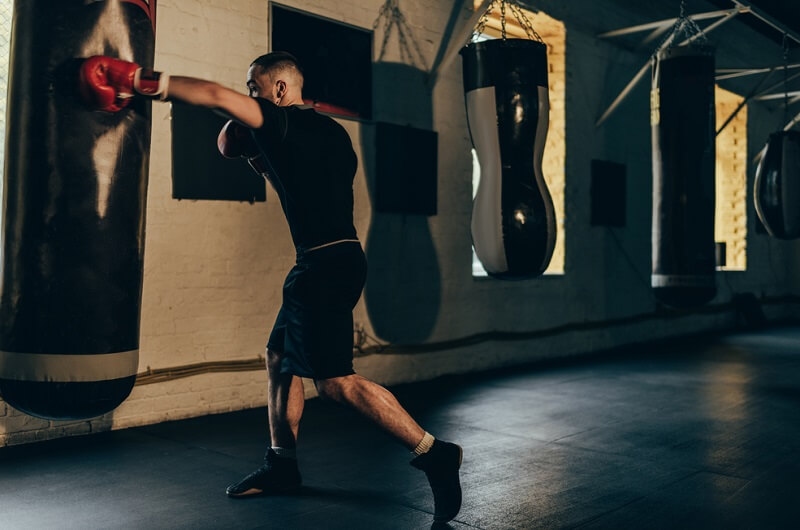
Close
Boxing is a combat sport that involves two opponents wearing padded gloves and throwing punches at each other within a roped-off square ring. It requires a combination of physical and mental discipline, as well as tactical skills. The goal of the sport is to knock out the opponent, achieve a higher score through punches landed, or force the opponent to retire. Beginners in boxing should start with the basics of footwork, stance, and proper punching technique and gradually progress to more advanced skills, such as combinations and defensive maneuvers. It is important to wear protective gear during training and sparring sessions and to work with a qualified trainer or coach to ensure safety and proper technique.

Boxing is a sport that requires a strong foundation of basic skills. Before you can throw complex combinations or spar with an opponent, you need to master the basics of footwork, stance, and proper punching technique. Don't be in a hurry to rush into the more advanced skills. Take the time to perfect the basics, and you'll find that the more advanced skills will come much more easily.
Boxing is a technical sport that requires precise technique and strategy. A good coach or trainer can help you develop the skills and knowledge you need to succeed in the sport. Look for a coach or trainer who is experienced and knowledgeable and who can work with you one-on-one to help you develop your skills. Your coach or trainer should also be able to help you set goals and develop a training plan that is tailored to your specific needs.
Boxing is a physically demanding sport that requires a high level of fitness. If you're not already in good shape, you'll need to work on your cardio and strength training to prepare for the rigors of the sport. Running, jumping rope, and doing high-intensity interval training (HIIT) are all good ways to improve your cardiovascular fitness. Strength training exercises such as weight lifting and bodyweight exercises will help you develop the strength and power you need to throw strong punches.
Sparring is an essential part of boxing training, but it can also be dangerous if not done properly. Before you start sparring, make sure you have a good foundation of basic skills and techniques. Start with light sparring, and gradually work your way up to more intense sparring sessions as you become more comfortable and confident in the ring. Always wear protective gear such as headgear, mouthguard, and gloves during sparring, and listen to your coach or trainer's instructions at all times.
Boxing is a sport that requires a lot of hard work and dedication. If you want to succeed, you need to stay committed and consistent in your training. Make a schedule and stick to it, even on days when you don't feel like training. Set realistic goals for yourself and work towards them every day. Remember that progress takes time, so be patient and don't get discouraged if you don't see results right away. Stay focused and dedicated, and you'll eventually achieve the success you're looking for.

Boxing is a high-intensity workout that gets your heart pumping and your blood flowing. It's an excellent way to improve your cardiovascular health and reduce your risk of heart disease, stroke, and other cardiovascular problems. By consistently engaging in boxing training, you can improve your endurance, stamina, and overall cardiovascular fitness.
Boxing is a full-body workout that engages multiple muscle groups, including your arms, shoulders, back, core, and legs. By consistent training, you can increase your strength and muscle tone, making you more powerful and explosive. The strength and muscle tone gained from boxing can also help you in other areas of your life, such as lifting heavy objects or performing daily activities.
Boxing requires precise movements and footwork, which can help improve your coordination and balance. By consistently practicing the footwork and movement patterns used in boxing, you can improve your overall body control and coordination, making you more agile and balanced.
Boxing can also be a great stress reliever and can help improve your mental health. The intense physical activity and concentration required in boxing can help you release pent-up emotions and tension, providing a sense of relief and relaxation. Boxing can also improve your self-confidence and self-esteem, giving you a positive outlook on life.
Boxing is a combat sport that teaches self-defense skills that can be useful in real-life situations. By learning how to throw punches and defend yourself, you can develop the confidence and skills needed to protect yourself and your loved ones in dangerous situations. Additionally, the discipline and focus required in boxing can also help you develop the mental fortitude needed to handle high-pressure situations in everyday life.
Boxing can also create a sense of community and camaraderie. Many boxing gyms and clubs offer group training sessions and classes, which can help you meet new people and make new friends who share your interest in the sport. The shared experience of training and sparring with others can also create a sense of support and motivation, pushing you to achieve your goals and become a better boxer.

Poor footwork is one of the most common mistakes beginners make in boxing. Footwork is essential in boxing because it allows you to move around the ring, dodge punches, and set up your own punches. To avoid poor footwork, practice basic footwork drills, such as shadowboxing and jumping rope. Focus on keeping your weight on the balls of your feet, maintaining good balance, and staying light on your feet.
Another common mistake beginners make is dropping their hands during a fight. Dropping your hands leaves you vulnerable to your opponent's punches and can result in serious injury. To avoid this mistake, keep your hands up at all times, with your elbows tucked in and your fists protecting your face. Practice shadowboxing and mitt work to improve your hand speed and technique.
Many beginners focus too much on offense and forget about defense. Defense is just as important as offense in boxing, as it allows you to avoid your opponent's punches and counterattack effectively. To avoid neglecting defense, practice defensive drills such as slipping, rolling, and blocking punches. Make sure to keep your eyes on your opponent and maintain good footwork to evade punches.
Beginners often focus too much on power punches, such as hooks and uppercuts, and neglect their jabs and other basic punches. Overreliance on power punches can leave you open to counterattacks and make you predictable in the ring. To avoid this mistake, practice and perfect your basic punches, such as the jab and straight right, before moving on to more advanced punches.
Boxing is a physically demanding sport that requires a lot of conditioning and endurance. Many beginners neglect their conditioning and focus solely on technique, which can lead to fatigue and burnout. To avoid this mistake, incorporate conditioning exercises, such as running, jumping rope, and strength training, into your training routine. Focus on building endurance, strength, and explosiveness, and maintain a healthy diet to fuel your workouts.
Sparring is a crucial component of boxing training, as it allows you to practice your technique and develop your skills in a live setting. Many beginners are hesitant to spar and avoid it altogether, which can hinder their progress and make them unprepared for real fights. To avoid this mistake, start sparring in a controlled environment with a skilled partner and a coach who can provide guidance and feedback. Focus on improving your technique and defense, and gradually increase the intensity and duration of your sparring sessions as you improve.
Finally, many beginners lack the focus and discipline required to succeed in boxing. Boxing requires a lot of mental fortitude and dedication, as well as physical skill. To avoid this mistake, set clear goals for yourself and create a training schedule that allows you to achieve those goals. Stay committed to your training routine, maintain a positive attitude, and stay focused on your goals, even in the face of setbacks and challenges.
Overall, boxing can be a rewarding and challenging sport for beginners, as it improves not only physical fitness but also mental toughness and discipline. It is important to approach the sport with respect and caution, as it can be dangerous if not performed properly. Consistent training and dedication are necessary to make progress and improve in the sport. With proper guidance from a qualified trainer or coach, beginners can learn the fundamental skills of boxing and work towards achieving their goals, whether it be for competition or personal development. Ultimately, boxing can be a valuable activity for anyone looking to improve their fitness, discipline, and self-confidence.